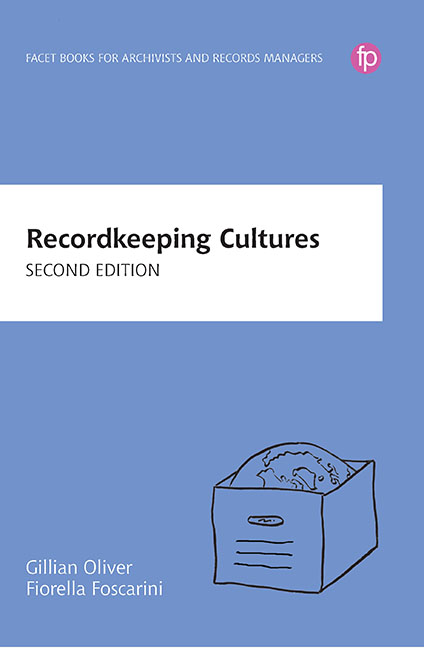9 - The Toolkit
Published online by Cambridge University Press: 28 October 2020
Summary
The Information Culture Analysis Toolkit (hereafter, the toolkit) that is introduced in this chapter is one of the most significant innovations produced by our research on information and recordkeeping culture. The toolkit was developed thanks to funding provided by the International Council on Archives’ (ICA) Programme Commission (PCOM), which allowed us to conduct a series of case studies where we applied the ICF as presented in the first edition of this book (Oliver and Foscarini, 2014).
The chapter starts with an overview of the ICA-funded research project that resulted in the development of the toolkit as its major deliverable. The components of the toolkit and how they can be applied to a variety of recordkeeping environments will be described. This initial section is followed by a detailed explanation of the cultural indicators identified as key to the analysis of information culture – i.e. genres, workarounds and infrastructure. A brief discussion of the results of testing the toolkit in real organisations is followed by an explanation of the kind of reasoning that informs our culturally sensitive approach to information management and recordkeeping, that is, ‘soft’ systems thinking.
‘Learning to walk the talk’
Immediately after the publication of Records Management and Information Culture: tackling the people problem (Oliver and Foscarini, 2014) we were awarded an ICA-PCOM grant that allowed us to carry out an action research project, ‘Learning to Walk the Talk: Analysing Information Culture’. Through an exploration of the information cultures of archival authorities, the project aimed to help organisational actors to understand and apply the key concepts of information culture as part of next-generation recordkeeping practice. The decision to focus on archival authorities (namely, the national archives of Australia, Fiji, the Netherlands and Brazil) had nothing to do with their core functions, in the sense that we were not interested in analysing the ways they managed their holdings or how they served researchers and the general public. Instead we wanted to study the information culture of communities (archivists and records managers) in different parts of the world that supposedly understand the value of records and are therefore expected to act accordingly (‘walk the talk’).
- Type
- Chapter
- Information
- Recordkeeping Cultures , pp. 151 - 170Publisher: FacetPrint publication year: 2019

